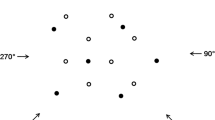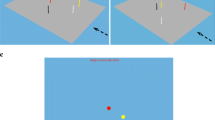Abstract
Research on spatial memory indicates that locations are remembered relative to reference frames, which define a spatial reference system. Reference frames are thought to be selected on the basis of environment-based and experience-based cues present during learning. Results from new experiments indicate that reference frames provide scaffolding during the development of spatial memories: the reference frame used to organize locations studied from one perspective was also used to organize new locations studied from another perspective. Further results indicate that the role of reference frames during spatial memory development can cross sensory modalities. Reference frames that organized memories of a visually-experienced environment also organized memories of haptically-experienced locations studied within the same environment. These findings indicate a role for reference frames during spatial memory development, and demonstrate that reference frames influence cross-modal spatial learning.
Access this chapter
Tax calculation will be finalised at checkout
Purchases are for personal use only
Preview
Unable to display preview. Download preview PDF.
Similar content being viewed by others
References
Avraamides, M.N.: Spatial updating of environments described in texts. Cognitive Psychology 47(4), 402–431 (2003)
Avraamides, M.N., Kelly, J.W.: Imagined perspective-changing within and across novel environments. In: Freksa, C., Nebel, B., Knauff, M., Krieg-Brückner, B. (eds.) Spatial Cognition IV. LNCS (LNAI), vol. 3343, pp. 245–258. Springer, Heidelberg (2005)
Avraamides, M.N., Kelly, J.W.: Multiple systems of spatial memory: Evidence from described scenes. Journal of Experimental Psychology: Learning, Memory & Cognition (in press)
Avraamides, M.N., Kelly, J.W.: Multiple systems of spatial memory and action. Cognitive Processing 9, 93–106 (2008)
Brockmole, J.R., Wang, R.F.: Changing perspective within and across environments. Cognition 87, B59–B67 (2003)
Golledge, R.G., Ruggles, A.J., Pellegrino, J.W., Gale, N.D.: Integrating route knowledge in an unfamiliar neighborhood: Along and across route experiments. Journal of Environmental Psychology 13, 293–307 (1993)
Greenauer, N., Waller, D.: Micro- and macro-reference frames: Specifying the relations between spatial categories in memory. Journal of Experimental Psychology: Learning, Memory, & Cognition (in press)
Hanley, G.L., Levine, M.: Spatial problem solving: The integration of independently learned cognitive maps. Memory & Cognition 11(4), 415–422 (1983)
Hintzman, D.L., O’Dell, C.S., Arndt, D.R.: Orientation in cognitive maps. Cognitive Psychology 13, 149–206 (1981)
Hirtle, S.C., Jonides, J.: Evidence of hierarchies in cognitive maps. Memory & Cognition 13, 208–217 (1985)
Holding, C.S., Holding, D.H.: Acquisition of route network knowledge by males and females. Journal of General Psychology 116, 29–41 (1988)
Ishikawa, T., Montello, D.R.: Spatial knowledge acquisition from direct experience in the environment: Individual differences in the development of metric knowledge and the integration of separately learned places. Cognitive Psychology 52(2), 93–129 (2006)
Kelly, J.W., Avraamides, M.N., Loomis, J.M.: Sensorimotor alignment effects in the learning environment and in novel environments. Journal of Experimental Psychology: Learning, Memory & Cognition 33(6), 1092–1107 (2007)
Kelly, J.W., McNamara, T.P.: Spatial memories of virtual environments: How egocentric experience, intrinsic structure, and extrinsic structure interact. Psychonomic Bulletin & Review 15(2), 322–327 (2008)
Lederman, S.J., Klatzky, R.L.: Hand movements: A window into haptic object recognition. Cognitive Psychology 19, 342–368 (1987)
Maguire, E.A., Burke, T., Phillips, J., Staunton, H.: Topographical disorientation following unilateral temporal lobe lesions in humans. Neuropsychologia 34(10), 993–1001 (1996)
Maki, R.: Categorization and distance effects with spatial linear orders. Journal of Experimental Psychology: Human Learning & Memory 7, 15–32 (1981)
May, M.: Cognitive and embodied modes of spatial imagery. Psychologische Beitrage 38, 418–434 (1996)
May, M.: Imaginal perspective switchers in remembered environments: Transformation versus interference accounts. Cognitive Psychology 48, 163–206 (2004)
McNamara, T.P.: Mental representations of spatial relations. Cognitive Psychology 18, 87–121 (1986)
McNamara, T.P.: How are the locations of objects in the environment represented in memory? In: Freksa, C., Brauer, W., Habel, C., Wender, K.F. (eds.) Spatial Cognition III. LNCS (LNAI), vol. 2685, pp. 174–191. Springer, Heidelberg (2003)
McNamara, T.P., Halpin, J.A., Hardy, J.K.: Spatial and temporal contributions to the structure of spatial memory. Journal of Experimental Psychology: Learning, Memory, & Cognition 18(3), 555–564 (1992)
McNamara, T.P., Hardy, J.K., Hirtle, S.C.: Subjective hierarchies in spatial memory. Journal of Experimental Psychology: Learning, Memory & Cognition 15, 211–227 (1989)
McNamara, T.P., Rump, B., Werner, S.: Egocentric and geocentric frames of reference in memory of large-scale space. Psychonomic Bulletin & Review 10(3), 589–595 (2003)
Moar, I., Carleton, L.R.: Memory for routes. Quarterly Journal of Experimental Psychology A 34, 381–394 (1982)
Montello, D.R.: Spatial orientation and the angularity of urban routes: A field study. Environment and Behavior 23(1), 47–69 (1991)
Montello, D.R., Pick, H.L.: Integrating knowledge of vertically-aligned large-scale spaces. Environment and Behavior 25, 457–484 (1993)
Mou, W., McNamara, T.P.: Intrinsic frames of reference in spatial memory. Journal of Experimental Psychology: Learning, Memory, and Cognition 28(1), 162–170 (2002)
Shelton, A.L., McNamara, T.P.: Systems of spatial reference in human memory. Cognitive Psychology 43(4), 274–310 (2001)
Shepard, R., Metzler, J.: Mental rotation of three dimensional objects. Science 171(972), 701–703
Stevens, A., Coupe, P.: Distortions in judged spatial relations. Cognitive Psychology 10, 422–437 (1978)
Valiquette, C.M., McNamara, T.P., Smith, K.: Locomotion, incidental learning, and the selection of spatial reference systems. Memory & Cognition 31, 479–489 (2003)
Waller, D., Lippa, Y., Richardson, A.: Isolating observer-based reference directions in human spatial memory: Head, body, and the self-to-array axis. Cognition 106, 157–183 (2008)
Waller, D., Montello, D., Richardson, A.E., Hegarty, M.: Orientation specificity and spatial updating of memories for layouts. Journal of Experimental Psychology: Learning, Memory, & Cognition 28, 1051–1063 (2002)
Wang, R.F., Spelke, E.S.: Updating egocentric representations in human navigation. Cognition 77, 215–250 (2000)
Wang, R.F., Spelke, E.S.: Human spatial representation: insights from animals. Trends in Cognitive Sciences 6(9), 376–382 (2002)
Werner, S., Schmidt, K.: Environmental reference systems for large-scale spaces. Spatial Cognition and Computation 1(4), 447–473 (1999)
Yamamoto, N., Philbeck, J.W.: Egocentric and intrinsic frames of reference in haptic spatial learning. Poster presented at the 49th annual meeting of the Psychonomic Society, Chicago, IL (2008)
Yamamoto, N., Shelton, A.L.: Visual and proprioceptive representations in spatial memory. Memory & Cognition 33, 140–150 (2005)
Yamamoto, N., Shelton, A.L.: Orientation dependence of spatial memory acquired from auditory experience. Psychonomic Bulletin & Review 16(2), 301–305 (2009)
Author information
Authors and Affiliations
Editor information
Editors and Affiliations
Rights and permissions
Copyright information
© 2010 Springer-Verlag Berlin Heidelberg
About this paper
Cite this paper
Kelly, J.W., Avraamides, M.N., McNamara, T.P. (2010). Reference Frames Influence Spatial Memory Development within and Across Sensory Modalities. In: Hölscher, C., Shipley, T.F., Olivetti Belardinelli, M., Bateman, J.A., Newcombe, N.S. (eds) Spatial Cognition VII. Spatial Cognition 2010. Lecture Notes in Computer Science(), vol 6222. Springer, Berlin, Heidelberg. https://doi.org/10.1007/978-3-642-14749-4_20
Download citation
DOI: https://doi.org/10.1007/978-3-642-14749-4_20
Publisher Name: Springer, Berlin, Heidelberg
Print ISBN: 978-3-642-14748-7
Online ISBN: 978-3-642-14749-4
eBook Packages: Computer ScienceComputer Science (R0)




